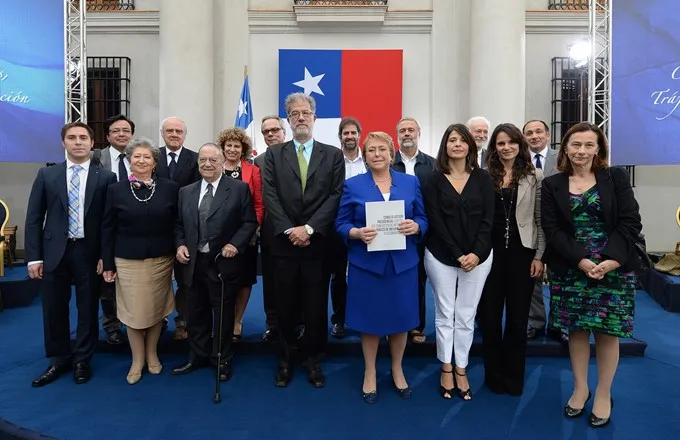President Michelle Bachelet proposes ambitious political reforms for Chile after receiving proposals from Presidential Advisory Council that included the participation of International IDEA

On 10 March, Chilean President Michelle Bachelet established the Presidential Advisory Council against conflicts of interest, influence peddling and corruption, in response to her commitment to take institutional measures to regulate the relationships between money and politics, in both the public and private sectors.
On announcing the establishment of the Council, President Bachelet, stated:
“Conflicts of interest, influence-peddling, and corruption are a matter of concern in Chile today. There are several points of view as to the actual magnitude of the problem, but it is evident that specific cases have been presented to the citizens of late – whose definitive outcome is not yet known – that have been particularly striking given the identity of the protagonists and the extent of the problem. Inevitably, doubt and distrust also reach the institutions in which such situations have occurred, and raise questions as to the adequacy of the rules that govern them, be they public or private.”
The “Engel Commission,” in reference to the economist Eduardo Engel, who chaired the Council, commenced its work on 11 March, and on 24 April, delivered its final report, to President Bachelet. The Council was made up of 16 members, among them Daniel Zovatto, regional director of International IDEA for Latin America and the Caribbean, - the only non-Chilean council member. Throughout the five chapters of the report (Preventing corruption, Regulating conflicts of interest, Political financing to strengthen democracy, Confidence in markets, and Integrity, ethics, and citizen rights), 236 measures are proposed to further transparency and probity.
Measures highlighted include:
- Preventing corruption:
- Strengthening the municipal governments as the key to the state’s bond with citizens
- Reforming the system for high-level public administration to ensure a solid performance by the civil servants
- The reform of the government procurement system, concessions, and defense spending to ensure transparency, efficiency, and competition
- The prosecution and criminal punishment of corruption.
- Regulating conflicts of interest:
- Regulation of the “revolving door” to ensure that the decisions and actions of authorities and civil servants are driven by the interests of the Chilean society, and not by personal benefits
- Grounds for disqualification from holding public office.
- Financing the policy to strengthen democracy:
- Internal democracy and financing of political parties, including a new law on political parties prohibiting contributions by juridical persons (corporations) to political parties and election campaigns
- Establishing a public fund to finance political parties
- Regulating campaigns to ensure fairness in competition, guaranteeing transparency and accountability, and the oversight of politics and political financing, strengthening the Electoral Service (Servicio Electoral, or Servel) and the Elections Certification Tribunal (Tribunal Calificador de Elecciones, or Tricel).
- Confidence in markets:
- By effective oversight
- Strengthening the governing bodies of corporations.
- Integrity, ethics, and citizen rights:
- Through civics and ethics training as a fundamental aspect for strengthening a democratic society.
The contribution of International IDEA was focused mainly in the area of political finance, by providing extensive comparative international experience in the form of global handbooks, comparative studies covering the Latin American region, and databases.
In addition, International IDEA facilitated an exchange of experiences among the electoral authorities of Mexico, Brazil, and Colombia.
According to Eduardo Engel, International IDEA’s contribution to strengthening the system for oversight and review by Chile’s electoral courts was essential, especially in light of the experiences International IDEA has had with similar reforms in other countries within the region.
On 28 April, President Michelle Bachelet addressed the entire country on a national television and radio broadcast to announce a series of institutional reforms and legal initiatives the office of the President will initiate over the coming weeks, based on the Report by the Presidential Advisory Council. On this occasion, the President indicated that "they are severe measures, and some will want to resist them in order for things to stay the same. But the principle I abide by is clear: democracy and politics are for everyone, and we cannot tolerate them being captured by the power of money.” The following are among the main reforms proposed by the President:
- Public financing for the political parties, in exchange for introducing a series of conditions for them to strengthen their internal democracy. She also proposed that all political party members re-register, to ensure more reliable political party roles.
- Prohibition of contributions by corporations or any other juridical person to political campaigns.
- The Chilean administrative electoral body, the Electoral Service (Servel), will have constitutional autonomy, and will be allocated more resources and powers to strengthen its oversight authority.
- Those legislators who “violate the public trust” shall lose their seats.
- Improve the system of the high-level public administration and introduce mechanisms to keep public servants who leave their jobs in the state from immediately entering the business world (revolving door).
- Regulate election campaigns to cut their costs, especially for advertising in public spaces (such as posters, leaflets, etc.).
- Introduce “civic education” into the basic curriculum in primary and secondary schooling.
- Establish an Office of Citizen Ombudsperson (Defensoría Ciudadana) whose function will be to protect citizen rights against potential abuses by the state.
The President also indicated that many of the measures announced, in particular those that call for legislation or that would entail institutional changes, will be forwarded by the Executive to Congress in the next 40 days for legislative debate.



